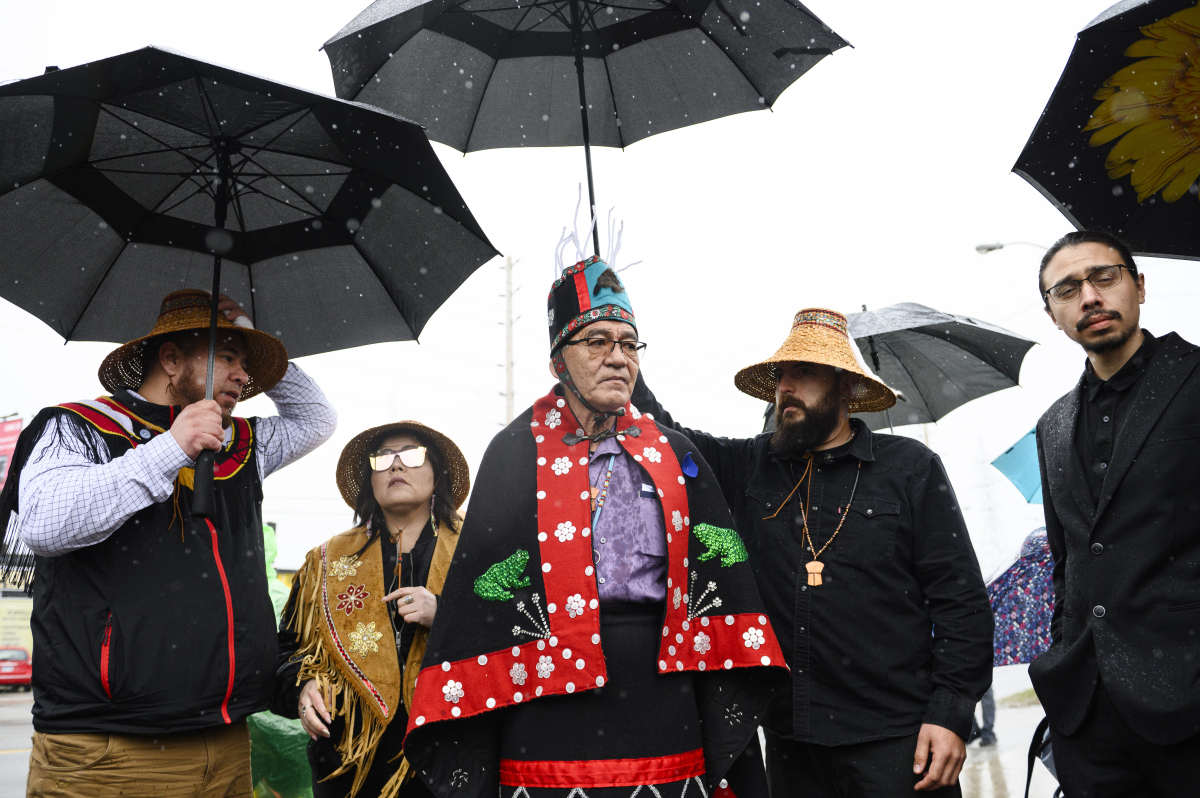Support strong Canadian climate journalism for 2025
Canada provided up to $200 million to pipeline company Coastal Gaslink, recently updated financial data reveals — an apparent violation of a commitment to phase out fossil fuel subsidies.
According to Export Development Canada (EDC), a Crown corporation that provides loans and grants to help businesses reach the market, Coastal Gaslink was given between $100 million and $200 million worth of project financing to help it export gas. The publicly-disclosed financing is thin on details, but was signed on June 27.
Coastal GasLink, owned by Calgary-based TC Energy, snakes through several Indigenous territories, including the Wet’suwet’en Nation. Wet’suwet’en hereditary leadership, who maintains jurisdiction over the land in question, opposes the pipeline. Hereditary Chief Namoks (also known as John Ridsdale), told Canada’s National Observer he was disappointed to see hundreds of millions of dollars provided to a company violating his nation’s rights.
Any government funding “that goes against human rights, Indigenous rights and [the United Nations Declaration on the Rights of Indigenous Peoples] simply should not be allowed,” he said.
“So it clearly shows the oil and gas industry is steering the government.”
The EDC financing appears to run counter to a longstanding commitment from the federal government to phase out fossil fuel subsidies. That promise, however, did not stop Ottawa from providing billions of dollars of taxpayer money to get another controversial pipeline, the Trans Mountain expansion project, over the finish line.
"Every person who has spent the last few weeks fleeing wildfires or choking on smoke should be outraged and asking for their money back,” Greenpeace Canada senior strategist Keith Stewart said in an email. “As an agency owned by the people of Canada, EDC should not be handing out hundreds of millions of dollars to oil and gas companies like TC Energy so they can expand fossil fuel production and thereby make climate change worse."
Finance Canada disagrees. In a statement, deputy spokesperson Caroline Thériault said the investment "does not contravene the government's commitment to phase out inefficient fossil fuel subsidies."
“Canada is committed to developing and releasing an implementation plan to phase out public financing of the fossil fuel sector, including by federal Crown corporations, by fall 2024," she said.
The new loan to Coastal GasLink follows a separate loan worth between $400 and $500 million to Cedar LNG, based in Kitimat, British Columbia. The Coastal GasLink pipeline would transport gas from the Montney region of northeastern B.C., to export terminals like LNG Canada and Cedar LNG on the coast.
Weeks before the financing was agreed, TC Energy said it concluded a $7.15 billion bond offering to help pay off of loans to build the pipeline – the cost of which surged to $14.4 billion thanks to repeated construction delays and protests.
Buckling under the weight of its construction debt, while also seeking to build a second phase to the Coastal GasLink pipeline for even further gas sales, the company issued what it called the “largest corporate bond offering in Canadian history,” which “speaks to the nation-building importance of this critical energy infrastructure.”
In a statement, Sean O’Donnell, executive vice-president and chief financial officer with TC Energy, called the gas “secure, affordable, and sustainable,” and “the most responsibly produced natural gas in the world.”
The gas TC Energy extracts to push through the Coastal GasLink pipeline is fracked from the Montney formation in northeastern British Columbia. The gas deposit in this region is so massive, it is considered the country’s largest “carbon bomb.” If developed, it would become Canada’ largest source of greenhouse gas emissions, and its extraction comes with significant health and environmental impacts, according to experts.
“Beyond the climate damage that would be unavoidable in a fracking for LNG boom, the market and economic outlook for B.C. LNG is shaky,” the David Suzuki Foundation noted in a report published last month. “As the world’s leading energy market experts at the International Energy Agency indicate, LNG demand is set to drop as ever cheaper renewables are deployed at accelerating speed.
“The world is shifting to being powered more efficiently with clean electricity in pursuit of net-zero objectives.”
For years now, the Wet’suwet’en nation has pursued a two-pronged strategy to fight Coastal GasLink. Using blockades and encampments on their traditional territory, the nation and its allies have slowed construction, which pushes the cost higher. At the same time, the nation has pressured financiers, chief among them RBC, to cut ties.
At RBC’s annual general meeting in April, Chief Namoks said RBC is “only looking at the bottom line, but that bottom line is killing us.”
“Reconciliation can’t happen at the barrel of a gun,” he said, referring to three major RCMP raids into Wet’suwet’en territory in recent years where opponents of Coastal GasLink were arrested.
- With files from Natasha Bulowski






Comments
The trouble with Justin Trudeau Liberals, they are trying to be everything to everybody than stick to a clear climate change mitigation direction. If you are going to continue to loan tax payers money to the oil and gas industry and including subsidies, that just negates everything else being done to fight climate change. Overall, this just make the Liberals a big joke, and then they wonder why the party is tanking in the polls and a major dislike of Trudeau. The Liberals need to get their act together than the current contradictory climate change actions.
Their actions do not fit their words. That is likely their biggest problem, especially when repeated over and over for nine years.
By the time GasLink is completed China will have crossed the 50% mark in the replacement of coal and gas in their domestic economy with renewables and nuclear power.
Malaysia is now having second thoughts about importing LNG because it creates a dependency on foreign suppliers. It appears they were paying attention to Putin's long game of lulling Europe into becoming dependent on Russian oil and gas for almost 20 years before weaponizing his fossil fuel exports in an effort to blackmail dependent jurisdictions to do nothing when he revealed his true intentions of violent empire building. It's a very good thing that Europe and NATO fought back by aiding the Ukrainian victims while concurrently weaning themselves from that dependency.
Renewables offer the freedom of energy independence. According to Ember, the EU will reach 50% replacement of its gas consumption with its own renewables by 2030 if not before. 100% is definitely achievable.
Perhaps RBC and other financiers should rename their fossilized investment portfolios as the Stranded Asset Fund.
Leaked recordings of fossil fuel executives at the Calgary-based pipeline giant, TC Energy, expose how staff influence politicians, the media, and public opinion: from writing briefing notes for Ministers and Premiers, to undermining the voices of opposition groups, to influencing Premier David Eby's position on LNG during a trade mission to Asia.
"We’ve been given opportunities to write entire briefing notes for ministers and premiers and prime ministers and it gets stuck on government letterhead...There’s nothing more powerful than that," said TC Energy Executive, Liam Iliffe, who previously worked as a senior advisor under former BC NDP premier John Horgan.
Iliffe, who has since resigned, shared how TC Energy focused lobbying efforts to target Premier David Eby:
“We had a new premier with a new mandate... described on his very first day in office as ‘we cannot continue to expand fossil fuel infrastructure and hit our climate goals,’ ” Iliffe said. “This set off alarm bells, of course, across industry.”
When Premier Eby and cabinet ministers went on a trade mission to Asia in 2023, TC Energy briefed Canadian ambassadors on desired messaging to give to Eby about the gas sector.
The tactic worked.
“It was a marked shift in language when (Eby) came home,” Iliffe said.
https://email.mail.myseatosky.org/c/eJxszDGO6yAQgOHTQGdrGEhCCorX-BrRAEN…
It is either ironic or perfectly reasonable that the Eby government turned BC Hydro's lack of interest in supporting renewables into serious grants and loans for solar and wind projects across the board.
Ironic because that seems to counter the BC NDP's acceptance and promotion of LNG. Reasonable because BC intends to offer LNG outfits vast quantities of highly subsidized hydro power at very low rates average citizens will never enjoy.
I think irony will win the day given how renewables are starting to erode the international demand for LNG, and how Canadian LNG will never be an agile competitor on price, that is unless the export price is also foolishly subsidised even as the growth in renewables is increasingly exponential.
Critical thinking climate aware voters in BC are presented with a major quandary: Who do you vote for with alternative parties that are even more pushy on fossil fuels while sharpening their chainsaws for faster cutting down of old growth forests and social programs, or are too small and weak to make a difference.
Some have reached the conclusion that social programs are to be protected, but dealing with fossil exports may well have to be left to the fast evolving economics of solar and wind in BC's export markets, given BC's adoption of traditional Canadian two-facedness on climat/petroleum by progressive governments.
Meanwhile, those $10,000 grants for rooftop solar offered by the Eby government are looking pretty good. But then again, BC Hydro may well pay you for solar and redirect it to a grid that is undermined by huge quantities of power given to various LNG companies.
If/when LNG projects fail with weakening demand in overseas markets from foreign solar and wind production, that will leave BC with a surplus of clean power.
The need for a new industrial strategy for the far future is becoming apparent, one that kills the well worn Canadian penchant to export raw resources (too many of them are filthy) while importing finished products. Making finished products at home and promoting our own knowledge and expertise offer much greater benefits to society using value added principles. And most of these activities can be energized with zero and low emission electricity.
Hard to believe delays by protests cost 7 billion and bonds and loans are repayable .
Gas and won't disappear overnight but over decades. And as the article says renewables are way less expensive and is we plan selling gas to China that market may disappear. But other Asian countries need electricity and China will provide the tech and material as the Western World muddles around. Most predict the market will prevail by ignoring gas and oil, yet as Poilievre, Smith , Moe and Ford promote gas and oil expansion, Canadians will they have been screwed out of participation in the another great energy transition. The Fossil fuel industry will leave the Canadian public to clean up the mess as Big Oil bags the profits and moves on to something else. Typical capitalism, exploit, abandon move to the next resource, repeat